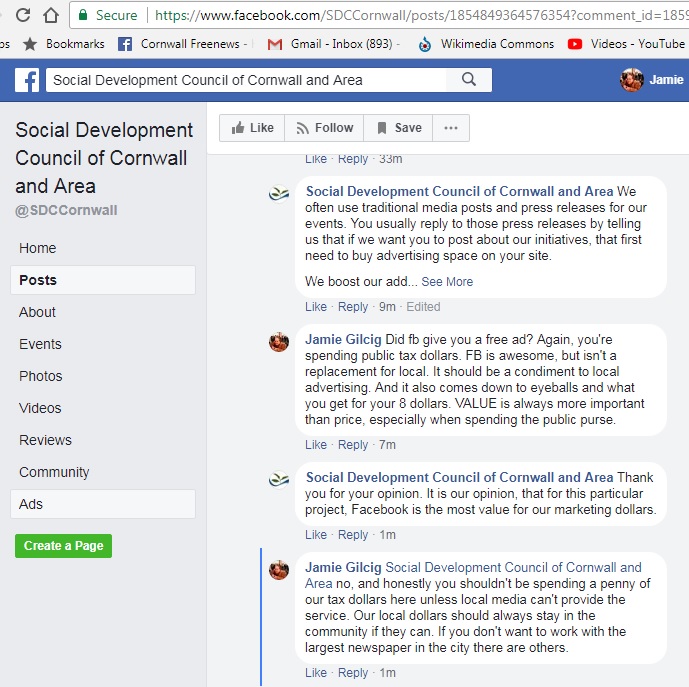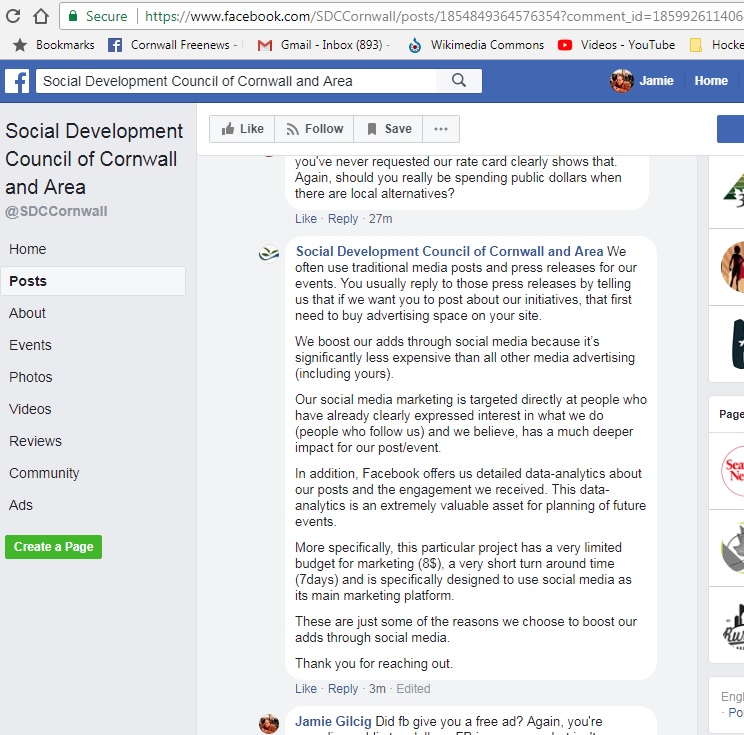Cornwall Ontario – Many are suggesting that the Cambridge Analytica data issue is simply the tip of the zuckerberg; that in this one instance there’s a whistleblower that clearly defines this instance, but that data from facebook has always been used and reused, and possibly marketed by facebook itself.
While those thoughts have not been proven like the Cambridge issue clearly some of the comments from founder Mark Zuckerberg, carefully crafted ones days after datagate broke, belie bigger issues that could potentially see facebook go myspace.
“I’m actually not sure we shouldn’t be regulated,” he told CNN. “I think the question more is what is the right regulation rather than should we be regulated.”
Of course social media should be regulated. The issue is that in many countries media has seen regulations erode and seen massive coagulation of independent voices into big entities like Bell in Canada. In this country there’s talk of the government funding media outlets for their very survival while pumping cash into foreign social media companies.
BBC asked Mark Zuckerberg in 2009 if Facebook would ever sell personal user data. His answer? “No! Of course not.” pic.twitter.com/pdX036NiKj
— Josh Caplan (@joshdcaplan) March 21, 2018
When you fill out those sappy little questionnaires online that look so silly and like so much fun you’re actually filling out profiles on yourself that anyone with access to that data can use for purposes from simple marketing to rigging of elections as is now being alleged in many countries including Canada.
“The Liberals were so good at the data campaign in 2015, in fact, that Americans were taking some lessons from them.”
The talented and charming Susan Delacourt continues…
As I wrote in 2016 in the updated version of my book, Shopping for Votes, the federal Liberals relied heavily on Facebook to win the last election — under the leadership of none other than Tom Pitfield, Trudeau’s close friend, occasional vacation partner and husband to Liberal party president Anna Gainey.
How important was Facebook to the Trudeau team? Here is some info that the Liberals themselves gave me after the campaign:
-
More than 13 million voters were reached by the Liberals through Facebook throughout the campaign; many of them deliberately targeted because they were in competitive ridings.
-
Roughly half of all attendees at Liberal rallies came from invitations received through Facebook, email or Twitter.
-
Trudeau was the first ever leader to launch his platform on Facebook.
-
Facebook was one of the tools used to identify individual voters through “calls to action” on social media, along with channels on Twitter and Instagram too.
-
Quite apart from the traditional TV, radio and print ads, Facebook was being used to generate hundreds of online advertisements, directed to specific audiences, much more cheaply. Liberals, like other parties, were using this data to see which messages worked and which ones didn’t, and constantly revising the pitch.
Any tool, and good on facebook if can do actually impact elections, that can impact a Nation’s rule clearly needs regulation. That lack of regulation is also a factor in why media and journalism in particular is suffocating in Canada. Without resources you can’t employ journalists or devote as much time as many important stories require.
An outside company with no real costs in Canada can compete at levels that no Canadian media company can. It’s a hugely unfair barrier. And sadly the perception is that facebook is cheaper when in many cases it is in fact not.
A local public entity here in Cornwall recently used facebook while not even responding to a heavily discounted ad offer for their event from the largest newspaper in its market.


Again, a quasi governmental group supported from the public purse really shouldn’t be sending any cash out of the community, certainly not when there are more economical options locally, unless a product or service isn’t available locally. It’s a bit bizarre seeing your tax dollars spent in this irresponsible manner.
facebook is a private company and has every right to do whatever it legally can to earn a living. That some practices may not be publicly disclosed may not even be illegal, but the Cambridge issue is enough that there is now a #nomorefacebook movement and companies such as Mozilla Firefox are stopping advertisements on the mammoth site. A large issue is that currently there really is no viable alternative to facebook which may change with regulation or if #datagate explodes.
Any industry of this size requires some regulation. And we need much more transparency with what happens when we participate on sites, especially on social media, and not buried deeply in the boilerplate that nobody, but lawyers usually ever reads.
What do you think dear CFN viewers? Will #datagate change how you participate on facebook and other social media sites?
You can post your comments below and please, support your local media, especially if it’s independent media. We are your communities voice, even the strange freaky parts of the community.
